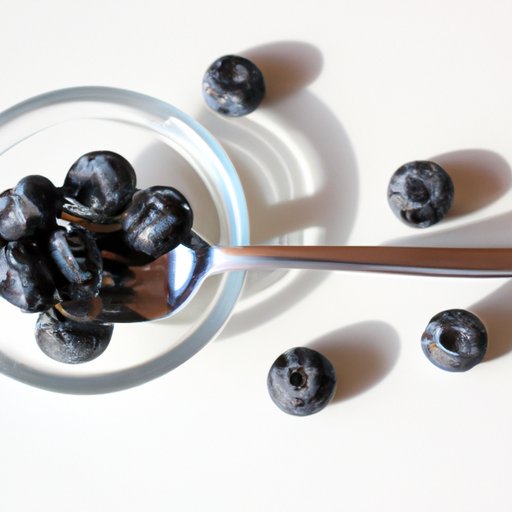Introduction
Blueberries are a delicious and nutritious fruit that is packed with vitamins, minerals, and antioxidants. As such, they have become increasingly popular in recent years, as people look for ways to improve their diets. But what exactly makes blueberries so healthy, and should you be adding them to your diet? This article will explore the health benefits and nutritional value of blueberries, and provide tips on how to get the most out of this superfood.

A Guide to Adding Blueberries to Your Diet
Blueberries are incredibly versatile and can be incorporated into all kinds of dishes, both sweet and savory. They can be eaten raw, cooked, frozen, or juiced, and they make a great addition to smoothies, yogurts, cereals, salads, and desserts. It is important to choose fresh, ripe blueberries, as frozen or canned varieties may be higher in sugar and contain fewer nutrients.
When shopping for blueberries, look for those that are plump and uniform in size, with no signs of mold or bruising. Store them in an airtight container in the refrigerator for up to 10 days. If you have a large amount of blueberries, you can also store them in the freezer for up to 6 months.
Is Eating Blueberries Good for You?
Blueberries are a nutrient-dense food that are packed with vitamins, minerals, and antioxidants. They are high in fiber, vitamin C, vitamin K, manganese, and other essential nutrients. They also contain phytochemicals and flavonoids, which have been linked to various health benefits.
Blueberries are low in calories and fat, making them a great choice for those looking to lose weight or maintain a healthy weight. They are also high in fiber, which helps to keep you feeling full longer and aids in digestion. Additionally, blueberries are a good source of antioxidants, which can help protect your cells from damage caused by free radicals.

How to Get the Most Nutritional Value from Blueberries
The best way to get the most nutritional value from blueberries is to eat them raw. However, you can also cook them in recipes such as pies, muffins, cakes, and jams. You can also add them to smoothies or yogurt for a quick and easy snack. When cooking with blueberries, it is important to use minimal heat and avoid overcooking, as this can reduce the nutritional value.
If you are looking for a way to maximize the nutritional value of blueberries, try blending them with other fruits and vegetables in a smoothie or juice. This can help increase the vitamin, mineral, and antioxidant content of the drink. Additionally, you can freeze blueberries to preserve their nutritional value and enjoy them year-round.
The Pros and Cons of Eating Blueberries
Like any food, there are both advantages and disadvantages to eating blueberries. On the plus side, they are packed with vitamins, minerals, and antioxidants, and they are low in calories and fat. Additionally, they are easy to incorporate into your diet, as they can be eaten raw, cooked, frozen, or juiced.
On the downside, some studies have suggested that consuming too many blueberries can lead to digestive issues, such as gas and bloating. Additionally, because they are high in sugar, it is important to limit your intake of blueberries if you are trying to watch your sugar intake.
Blueberry Nutrition: What Does Science Say?
Numerous studies have been conducted on the health benefits and nutritional value of blueberries. One study found that eating blueberries daily for eight weeks improved markers of cardiovascular health, including cholesterol levels and blood pressure. Another study showed that blueberries can help reduce inflammation and improve insulin sensitivity.
Additionally, blueberries are high in polyphenols, which are compounds that have been linked to a reduced risk of certain diseases, such as cancer and heart disease. The antioxidants in blueberries can also help protect against oxidative stress, which has been linked to aging, cognitive decline, and other health conditions.
Conclusion
Blueberries are a nutrient-dense superfood that offer a variety of health benefits. They are high in vitamins, minerals, and antioxidants, and they are low in calories and fat. Additionally, they can be incorporated into a variety of dishes, making them a convenient and delicious way to boost your nutrition. Despite this, it is important to remember that too much of anything is never good, and it is best to enjoy blueberries in moderation.
In conclusion, blueberries are a nutritious and delicious addition to any diet. With their high levels of vitamins, minerals, and antioxidants, they can help improve your overall health and wellbeing. So why not give them a try and see if they are right for you?
(Note: Is this article not meeting your expectations? Do you have knowledge or insights to share? Unlock new opportunities and expand your reach by joining our authors team. Click Registration to join us and share your expertise with our readers.)
